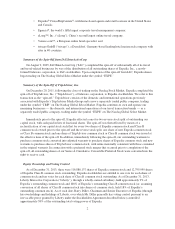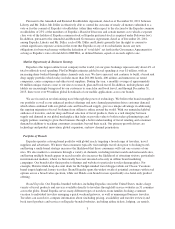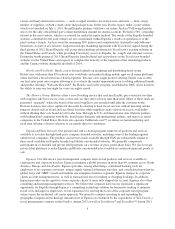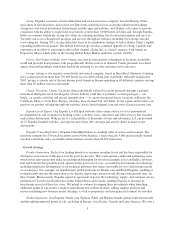Expedia 2013 Annual Report Download - page 18
Download and view the complete annual report
Please find page 18 of the 2013 Expedia annual report below. You can navigate through the pages in the report by either clicking on the pages listed below, or by using the keyword search tool below to find specific information within the annual report.Travel metasearch engines and content aggregators: Travel metasearch websites, including Kayak.com (a
subsidiary of Priceline), trivago (a majority-owned subsidiary of Expedia) and Qunar in China, as well as travel
research sites that have search functionality, such as TripAdvisor, aggregate travel search results for a specific
itinerary across supplier, travel agent and other websites. In addition, some metasearch sites, such as Kayak.com,
TripAdvisor and Qunar in China, offer consumers the ability to make reservations directly on their websites. To
the extent metasearch websites limit our participation within their search results, or consumers utilize the
metasearch website for travel services instead of ours, our traffic-generating arrangements could be affected in a
negative manner, or we may be required to increase our marketing costs to maintain market share, either of
which could have an adverse effect on our business and results of operations. In addition, as a result of our
acquisition of a majority ownership interest in trivago, we also now compete more directly with other metasearch
engines and content aggregators for advertising revenue. To the extent that trivago’s ability to aggregate travel
search results for a specific itinerary across supplier, travel agent and other websites is hampered, whether due to
its affiliation with us or otherwise, trivago’s business and results of operations could be adversely affected and
the value of our investment in trivago could be negatively impacted.
Corporate travel providers: Egencia, our full-service corporate travel management company, competes with
online and traditional corporate travel providers as well as vendors of corporate travel and expense management
software and services. Some of these competitors may have more financial resources, greater name recognition,
well-established client bases, or a broader global presence, which may make it difficult for us to retain or attract
new corporate travel clients.
Mobile platform travel applications: Mobile platforms, including smartphones and tablet computers, have
rapidly emerged and are continuing to grow significantly. The emergence and improved functionality of mobile
platforms has led to an increased use by consumers of standalone applications to research and book travel. If we
are unable to offer innovative, user-friendly, feature-rich mobile applications for our travel services, along with
effective marketing and advertising, or if our mobile applications are not used by consumers, we could lose
market share to existing competitors or new entrants and our future growth and results of operations could be
adversely affected.
Social media websites: Social media websites, including Facebook.com, continue to develop search
functionality for data included within its website, which may in the future develop into an alternative research
and booking resource for travelers, resulting in additional competition from new competitors.
We cannot assure you that we will be able to compete successfully against any current, emerging and future
competitors or on platforms that may emerge, or provide differentiated products and services to our traveler base.
Increasing competition from current and emerging competitors, the introduction of new technologies and the
continued expansion of existing technologies, such as metasearch and other search engine technologies, may
force us to make changes to our business models, which could affect our financial performance and liquidity.
Increased competition has resulted in and may continue to result in reduced margins, as well as loss of
travelers, transactions and brand recognition.
The industry in which we operate is dynamic and we may be required to modify our current business
models and practices or adopt new business models and practices in order to compete, either of which
could have an adverse effect on our business and financial position and performance.
We continue to adapt our business to remain competitive, including investing in emerging markets such as
metasearch, developing products for new platforms, such as mobile, or offering new optionalities, such as our
Expedia Traveler Preference initiative. These endeavors may involve significant risks and uncertainties,
including distraction of management from current operations, expenses associated with the initiatives, inadequate
return on investments. These initiatives may require significant investments, including changes to our financial
systems and processes, which could significantly increase our costs, increase the risk of payment delays and/or
12
























